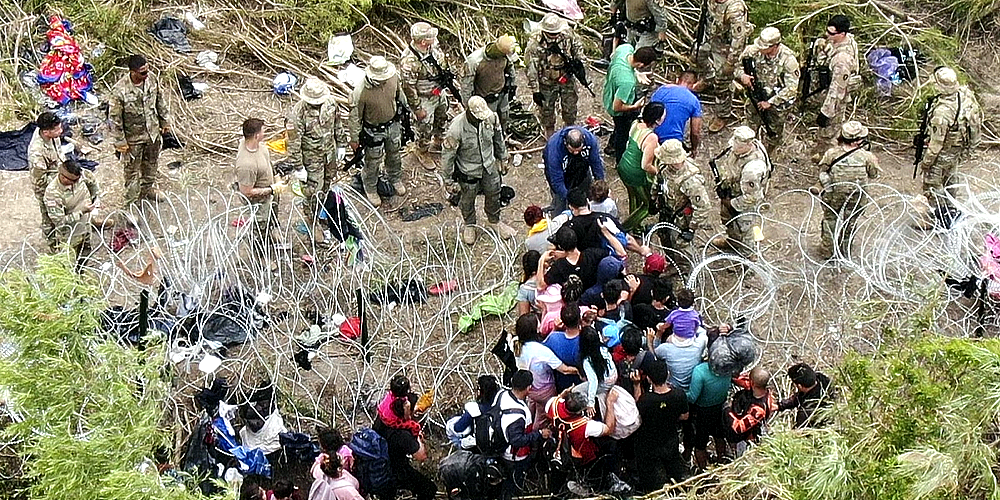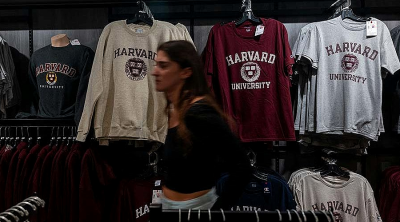CIUDAD JUÁREZ, Mexico: Under the intense desert sun, hundreds of migrants crossed the Rio Grande river from Mexico last week following a rumor the United States would let them enter — victims of another case of disinformation.
Claims spread by word of mouth and through social media that US authorities had opened a gate on the US border near the Mexican city of Ciudad Juárez to process asylum applications.
“I turned myself in through gate 40 with my family and they released us all… They don’t ask questions,” said a post in a Facebook group, one of dozens like it found by AFP.
But the gate did not open.
On the US side of the river, about a thousand migrants camped out in tents and makeshift shelters for days to turn themselves in to US officials from El Paso, Texas.
They wanted to cross before the lapse at midnight Thursday of a rule called Title 42, which was put in place under former president Donald Trump.
Ostensibly introduced to prevent people with Covid-19 from entering the United States, in practice it has been used to swiftly expel undocumented migrants.
Another rule called Title 8 that will remain in place means that people caught entering the United States illegally can not only be deported but also face a five-year ban on applying for legal entry.
Chain of lies
This year, thousands of migrants have mobilized on several occasions at the border due to disinformation allegedly spread by anti-immigration groups and people smugglers, according to experts.
In March, a crowd tried to cross an international bridge after hearing a rumor that people would be allowed to enter the United States as part of a supposed “migrants day.”
The Texas Customs and Border Protection (CBP) Office reported a similar event involving more than 1,000 people after a fire killed 40 migrants at an immigration detention center in Ciudad Juárez on March 27.
A rumor had already circulated in February that people who surrendered to US authorities would be taken to Canada.

Angel Pavon, a 52-year-old Venezuelan, was one of almost 500 migrants who believed it.
He turned himself in with his wife and daughters, aged 14 and 12, but they were expelled to Mexico.
“They made the girls cry because they treat you like a terrorist,” he said.
Heartbroken, he put his hope instead in a mobile application called CBP One, created by Washington for migrants to request appointments from outside the United States to seek asylum.
Criminal involvement
Given the glitchy performance of CBP One, groups have been created on Facebook and WhatsApp where migrants share experiences about the mobile application, but falsehoods also slip through.
According to Landon Hutchens, an official with the Customs and Border Protection Office in El Paso, criminal organizations also spread untruths.
“Illegal human smuggling is a multibillion-dollar illegal criminal enterprise that exploits and endangers vulnerable migrants. These criminal organizations are pushing disinformation on social media,” he said.
AFP has identified accounts on the video-sharing app TikTok in which alleged human traffickers and “immigration advisers” offer their services and sow confusion.
The migrants themselves share these contacts on Facebook.
Migrant smuggling is “a business whose communication strategies mainly use disinformation,” said Olivier Tenes of the International Organization for Migration.
On TikTok, people offer purported CBP One appointments, but testimonies gathered by AFP confirm they are scams.
Another cause for concern is “a select number of extremist groups seeking to create chaos and a narrative against immigration,” said Sam Woolley, a University of Texas social media and propaganda researcher.
For Enrique Valenzuela, a government official in the northern Mexican state of Chihuahua, migrants are susceptible to misinformation because they remember the part of the message “that gives them hope.”
In Ciudad Juárez, as night fell, migrants in front of Gate 40 took down their tents and formed lines when they saw three border agents on the other side.
But the gate remained shut.
ADVERTISEMENT
ADVERTISEMENT








































